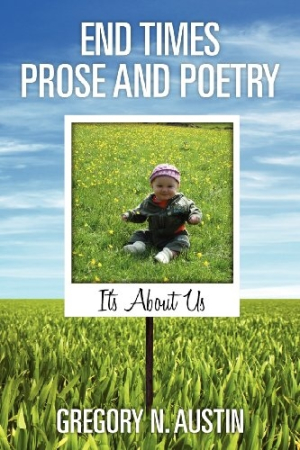End Times Prose and Poetry
Directly and urgently, Gregory Austin makes a case for change in his collection End Times Prose and Poetry. Only people can decide to save the earth by taking the necessary steps toward change at home and by urging lawmakers, leaders, and moneymakers to stop the destruction of the environment. Austin’s passion propels the prose portion of the book. His is a call to action for the sake of today’s youth and for future generations.
Austin readily admits he lacks formal credentials in environmental studies. He does, however, consider his status as father and grandfather to be part of his education and motivation. His love for his family and his hope for their future provide powerful impetus for him to enact the change he wants to see in the world. Unable and unwilling to give tacit acceptance via passivity, Austin has spent the last eleven years fighting for acknowledgment of the climate crisis as well as for government and grassroots reform.
Austin urges Americans to work as one to save the environment, citing the American Revolution and World War II as moments when the country came together to create a stronger future. According to the author, history has proven that the US is capable of large-scale change, and, as in those historic moments, he asserts that the country faces potential disaster should nothing be done.
The first portion of the book articulates Austin’s case for the reform of attitudes and policies regarding the environment. Though he offers many facts, none are supported by outside sources. Austin may have been trying to speak as an everyman, but the lack of citations hurts his ethos and may also make it difficult for interested readers to follow the intellectual path that led him to the book.
Austin’s prose is direct, easy to follow, and impassioned. For the most part, his perspective on climate change is in line with the views of political liberals in the US. Though he occasionally devolves into ranting, some of Austin’s finger-pointing is mitigated by his willingness to name himself as culpable.
Toward the end of the volume, Austin offers the reader his poems, which are organized into subsections such as “nature,” “religion,” “sports,” and “miscellaneous.” He states that he uses the poetic form in part because of its long history and unique relation to human expression, and in part because so few people use it today. Unfortunately, with no particular investment in detail, imagery, cadence, or formal precision, the poems lack punch. From Milton to Carolyn Forche, poets have certainly wrought political change throughout the ages, but the author misses an opportunity here to compel his audience.
Ultimately, Austin’s collection will likely appeal only to the already converted. His ideas about American history and the unique possibilities that exist for the country’s future are engaging, but most of the book covers well-trod ground without the benefit of exceptional writing or research.
Reviewed by
Camille-Yvette Welsch
Disclosure: This article is not an endorsement, but a review. The publisher of this book provided free copies of the book and paid a small fee to have their book reviewed by a professional reviewer. Foreword Reviews and Clarion Reviews make no guarantee that the publisher will receive a positive review. Foreword Magazine, Inc. is disclosing this in accordance with the Federal Trade Commission’s 16 CFR, Part 255.

